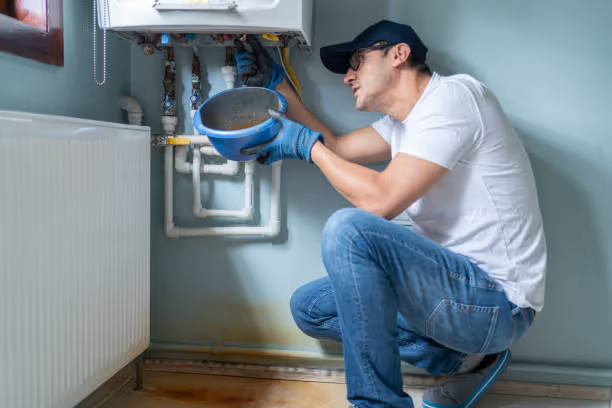Heating Maintenance in Riverhead, NY
Keeping your heating system reliable, efficient, and safe is essential in Riverhead, NY, where coastal winds, cold winter nights, and humid shoulder seasons put extra strain on equipment. A proactive heating maintenance program prevents midwinter breakdowns, preserves system life, and ensures safe combustion for gas and oil systems common in Long Island homes. Below is a clear, decision-focused guide to what professional heating maintenance includes, why it matters for Riverhead homes, common local issues, recommended service frequencies, what maintenance plans typically cover, and how enrollment usually works.

Why seasonal heating maintenance matters in Riverhead, NY
- Riverhead’s coastal climate exposes outdoor units, vents, and chimneys to salt air and higher humidity, accelerating corrosion and buildup that reduce efficiency.
- Winters can bring sustained cold, so a well-maintained system is critical to avoid emergency repairs and maintain indoor comfort.
- Many Long Island homes have older ductwork, oil furnaces, or mixed heating systems; regular inspections identify leaks, combustion problems, and safety risks like carbon monoxide leaks.
- Maintenance also helps systems meet manufacturer warranty requirements and keeps energy bills lower by preserving efficiency.
Common heating system types and typical issues in Riverhead homes
- Gas furnaces: dirty burners, clogged filters, faulty igniters, cracked heat exchangers, and venting problems.
- Oil furnaces and boilers: soot buildup, nozzle problems, combustion inefficiency, and corrosion from coastal moisture.
- Heat pumps and ductless systems: reduced capacity from refrigerant loss, dirty coils, and defrost cycle issues during cold snaps.
- Boilers (hot water/steam): low pressure, leaking valves, corroded piping, and expansion tank failures.
- Ductwork: leaks, insulation loss, and mold growth in humid seasons affecting airflow and indoor air quality.
What a complete heating maintenance visit includes
A professional seasonal tune-up follows a systematic checklist to maximize safety and performance. Typical tasks include:
- Filter inspection and replacement guidance: check or replace filters, and advise on appropriate MERV ratings for the home.
- Thermostat and control calibration: verify setpoints, wiring, and compatibility with smart thermostats.
- Combustion and safety checks (gas and oil systems): measure combustion efficiency, inspect burners, check flame patterns, test safety interlocks, and verify proper venting.
- Heat exchanger and burner inspection: visually inspect for cracks, corrosion, and soot buildup that indicate inefficiency or safety risk.
- Electrical system check: tighten connections, inspect capacitors and relays, and test motors for proper amperage draw.
- Blower and fan maintenance: clean blades, lubricate motors if applicable, and measure airflow.
- Flue, vent, and chimney inspection: clear obstructions, check for corrosion and proper draft, and recommend repairs if deterioration is found.
- Boiler-specific checks: assess pressure, expansion tank condition, relief valve operation, and water quality.
- Heat pump service: clean coils, check refrigerant charge, test defrost cycle, and inspect reversing valve and reversing controls.
- Duct inspection and sealing recommendations: evaluate leaks, insulation, and airflow issues that reduce overall system efficiency.
- Combustion safety testing: carbon monoxide test and confirmation that safety devices are operational.
- Filter and IAQ recommendations: advise on humidification, filtration upgrades, or whole-house IAQ options for coastal humidity and seasonal pollen.
Recommended service frequency
- Gas and oil furnaces: annual inspection and tune-up before the heating season.
- Boilers: annual comprehensive service, ideally in early fall.
- Heat pumps: two inspections per year (pre-heating season and pre-cooling season) to cover heating and cooling performance.
- Filters: inspect monthly; replace every 1 to 3 months depending on filter type, household pets, and indoor air quality needs.
- Chimneys and vents: annual inspection for homes with fireplaces or older venting systems.
Typical maintenance plan tiers and benefits (what to expect)
Maintenance programs are structured to make upkeep simple and predictable. Common tiers include:
- Basic plan: annual inspection and tune-up, filter reminders, and priority scheduling windows.
- Preferred plan: all Basic features plus seasonal biannual checks for heat pumps, minor repairs at reduced diagnostic rates, and safety testing.
- Comprehensive plan: everything in Preferred plus priority emergency service, waived diagnostic fees for covered repairs, annual IAQ check, and documented maintenance history for warranty compliance.
Benefits across plans:
- Reduced likelihood of breakdowns during peak cold spells.
- Improved fuel efficiency and lower utility bills through optimized combustion and clean components.
- Enhanced safety from routine carbon monoxide and combustion testing.
- Extended equipment life from timely adjustments and corrective maintenance.
- Priority service during busy winter months and a documented maintenance record useful for home resale or warranty claims.
How enrollment and scheduling generally work
Enrollment in a heating maintenance program typically involves selecting a plan level, completing a simple membership agreement, and setting up recurring seasonal visits for the year. Providers usually:
- Confirm the system type and service history.
- Schedule annual or biannual visits aligned with local seasonal cycles.
- Provide a written maintenance report after each visit detailing findings, actions taken, and recommendations for repairs or upgrades.This streamlined approach ensures your system is inspected proactively and that repeated tasks are handled without repeated scheduling.
What to do now to prepare your Riverhead home
- Note your system type, approximate age, and any recent issues so technicians can target inspections effectively.
- Replace easily accessible filters to improve airflow until a technician can perform a full tune-up.
- Ensure access to outdoor units and clear snow, ice, or debris from vents and flue areas.
- Keep CO detectors on every level and test them periodically; maintenance cannot replace functioning alarms.
Regular heating maintenance is a practical investment for Riverhead residents who want dependable, efficient, and safe home heating. A seasonal maintenance plan tailored to local climate challenges—salt air corrosion, humid conditions, and long heating seasons—helps keep systems running at peak performance, reduces unexpected repair costs, and maintains safe indoor environments throughout the winter months.
Customer Testimonials
Hear directly from homeowners who trust Bobby O’s HVAC Inc. for fast response times, honest service, and lasting comfort.











